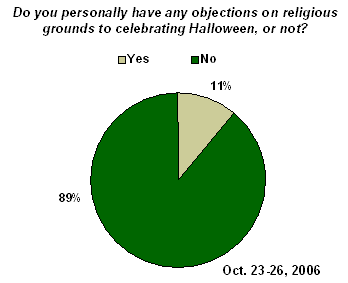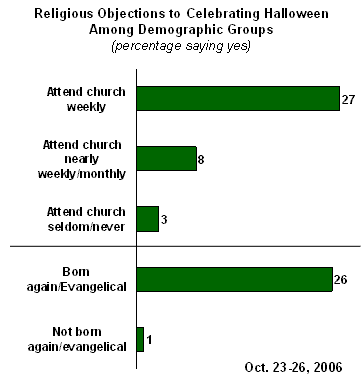GALLUP NEWS SERVICE
PRINCETON, NJ -- "Trick or treat" may be the most common greeting Americans will receive when they open their doors to little ghosts and goblins on Halloween night. A new Gallup Panel survey finds that roughly 1 in 10 Americans say they object to celebrating Halloween because of religious beliefs. More than 6 in 10 Americans tell Gallup they usually pass out treats to children on Halloween, and roughly the same percentage of parents usually dress their children in costumes. Few Americans report that they usually attend a Halloween party, wear a costume, or visit a haunted house or go on a haunted hayride.
Americans' Halloween Activities
The Oct. 23-26 Gallup Panel poll asked survey respondents if they usually, sometimes, or never do seven different activities to celebrate Halloween.
|
Americans' Halloween Activities |
||||
|
|
Some-times |
Usually/ |
Never |
|
|
% |
% |
% |
% |
|
|
Dress your children in costumes (asked of parents with children under age 18 only) |
65 |
13 |
78 |
20 |
|
Pass out treats to children at your house on Halloween |
64 |
19 |
83 |
16 |
|
Display Halloween decorations in your home or yard |
43 |
22 |
65 |
34 |
|
Carve a pumpkin to make a jack-o-lantern |
36 |
32 |
68 |
32 |
|
Attend a Halloween party |
16 |
43 |
59 |
40 |
|
Wear a costume |
14 |
33 |
47 |
53 |
|
Visit a haunted house or go on a haunted hayride |
8 |
33 |
41 |
58 |
The most common Halloween activities involve parents dressing their children in costumes (with 65% saying they usually do this), and adults across the country passing out treats to children at their home on Halloween (64% usually do this activity). Forty-three percent of Americans report that they usually display Halloween decorations in their home or yard, and a third of Americans (36%) say they usually carve a pumpkin to make a jack-o-lantern. Americans are least likely to say they usually attend a Halloween party (16%), wear a costume (14%), or visit a haunted house or go on a haunted hayride (8%).
As the table shows, a majority of respondents report that they do five of the activities at least sometimes: passing out treats to children, dressing children in costumes, carving a pumpkin, displaying decorations, and attending a Halloween party.
Younger Americans and older Americans enjoy different activities on Halloween. Americans between the ages of 18 and 34 are more likely than those who are older to say they usually attend a Halloween party, wear a costume, or display Halloween decorations. Americans aged 55 and older are less likely than those who are younger to carve a pumpkin or visit a haunted house. Americans aged 18 to 34 are less likely than older Americans to say they usually pass out treats to children. (This analysis does not include dressing children in costumes because of the smaller sample of parents interviewed in the survey.)
|
Americans' Halloween Activities by Age Groups |
|||
|
18- to 34- |
35- to 54- |
55 years |
|
|
% |
% |
% |
|
|
Pass out treats to children at your house on Halloween |
54 |
66 |
73 |
|
Display Halloween decorations in your home or yard |
49 |
43 |
39 |
|
Carve a pumpkin to make a jack-o-lantern |
45 |
42 |
19 |
|
Attend a Halloween party |
28 |
14 |
8 |
|
Wear a costume |
24 |
12 |
7 |
|
Visit a haunted house or go on a haunted hayride |
12 |
10 |
4 |
Religious Objections to Celebrating Halloween?
Religious attitudes appear to affect Americans' activities at Halloween. Americans who attend religious services every week are less inclined than those who do so less frequently to say they usually pass out treats to children, display Halloween decorations, or carve a pumpkin for Halloween. There is little difference between frequent and infrequent churchgoers' reports of attending a party, wearing a costume, or visiting a haunted house. Americans who describe themselves as born again or evangelical are less likely than those who do not identify themselves in this way to do five of the six activities listed in the survey.
|
Americans' Halloween Activities by Religious Attitudes |
|||||
|
|
Nearly weekly/ |
|
|
Not born |
|
|
% |
% |
% |
% |
% |
|
|
Pass out treats to children at your house on Halloween |
54 |
72 |
67 |
55 |
71 |
|
Display Halloween decorations in your home or yard |
35 |
47 |
47 |
29 |
53 |
|
Carve a pumpkin to make a jack-o-lantern |
28 |
38 |
39 |
29 |
41 |
|
Attend a Halloween party |
13 |
17 |
18 |
12 |
19 |
|
Wear a costume |
12 |
14 |
15 |
6 |
19 |
|
Visit a haunted house or go on a haunted hayride |
7 |
9 |
9 |
6 |
10 |
These religious differences in participation in Halloween activities are bound up with the objections some Americans have to the idea of celebrating Halloween in general, because of Halloween's connection to pagan rituals, the occult, and the devil. The poll asked Americans if they personally have any objections on religious grounds to celebrating Halloween. Eleven percent of Americans object to Halloween because of their religious beliefs.

As would be expected, those who frequently attend religious services and those who describe themselves as born again or evangelical are above the national average in objecting to Halloween, although the significant majority of even these groups does not object to the holiday.

Survey Methods
Results for this panel study are based on telephone interviews with 1,001 national adults, aged 18 and older, conducted Oct. 23-26, 2006. Respondents were randomly drawn from Gallup's nationally representative household panel, which was originally recruited through random selection methods. For results based on the total sample of national adults, one can say with 95% confidence that the margin of sampling error is ±3 percentage points.
For results based on the sample of 273 parents with children under age 18, the maximum margin of sampling error is ±7 percentage points.
In addition to sampling error, question wording and practical difficulties in conducting surveys can introduce error or bias into the findings of public opinion polls